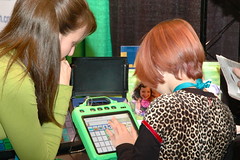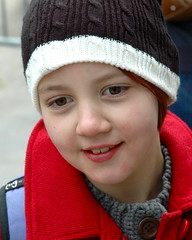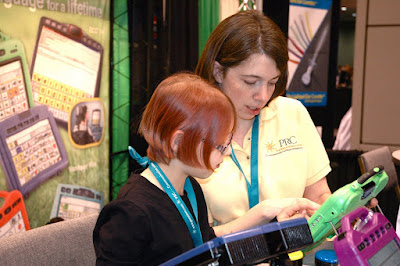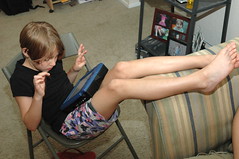And when it comes to AAC and its implementation, they know their stuff.
Anyway, here are some direct quotes from the book Exemplary Practices for Beginning Communicators: Implications for AAC by Joe Reichle, David Beukelman, and Janice Light. I'll have more to share soon.
(There are also some further resources listed at the end, so you can... Read More About It!)
-----
1.) "Although some existing research literature and recommended practices data support the notions that even very young children and other beginning communicators can use and benefit from AAC (e.g., Pierce, 1999; Romski & Sevcik, 1996), some professionals still believe that AAC is a last resort to be tried only after all other interventions have failed and the individual is still not talking (Romski, Sevcik, & Forrest, 2001). This belief may contribute to why AAC is often not incorporated into prelinguistic intervention strategies. Typically developing children primarily rely on gestures to communicate until about 12-13 months of age, when they increasingly use speech for communication (Goldin-Meadow, 2000). Using a developmental perspective, AAC interventions (e.g., gestures, devices, switches) can be viewed as tools to develop prelinguistic skills and set the stage for later vocabulary development regardless of whether the individual eventually talks."
2.) "Previously, it was assumed that individuals need to demonstrate the prerequisites of sensorimotor stage V for sufficient symbolic understanding to begin to learn how to use AAC (e.g., Chapman & Miller, 1980; Owens & House, 1984). It was later recognized that individuals can acquire some of the presumed prerequisite skills much earlier through the functional use of AAC in naturalistic environments (Kangas & Lloyd, 1988; Reichle & Karlan, 1985)."
(Quote specific to speech output devices:)
3.) "Romski and Sevcik (1996) argued that the use of a speech-output communication device was a critical component of their participants' successful use of SAL (System for Augmenting Language). They contended that the speech output provided a link to the natural auditory world for participants. Yet, no direct comparison of SAL acquisition (speech+symbols) with learning symbols alone was provided. Schlosser, Belfiore, Nigam, and Blischak (1995) conducted a study on three individuals with severe mental retardation who would have been considered beginning communicators. The researchers compared the participants' acquisition of visual graphic symbols and speech output with the acquisition of visual graphic symbols alone. They found that the speech output + visual graphic symbols resulted in more efficient learning with fewer errors than the visual graphic symbols alone. These results support Romski and Sevcik's argument that speech output can play a critical role in AAC language learning."
-----
1.) "Although some existing research literature and recommended practices data support the notions that even very young children and other beginning communicators can use and benefit from AAC (e.g., Pierce, 1999; Romski & Sevcik, 1996), some professionals still believe that AAC is a last resort to be tried only after all other interventions have failed and the individual is still not talking (Romski, Sevcik, & Forrest, 2001). This belief may contribute to why AAC is often not incorporated into prelinguistic intervention strategies. Typically developing children primarily rely on gestures to communicate until about 12-13 months of age, when they increasingly use speech for communication (Goldin-Meadow, 2000). Using a developmental perspective, AAC interventions (e.g., gestures, devices, switches) can be viewed as tools to develop prelinguistic skills and set the stage for later vocabulary development regardless of whether the individual eventually talks."
2.) "Previously, it was assumed that individuals need to demonstrate the prerequisites of sensorimotor stage V for sufficient symbolic understanding to begin to learn how to use AAC (e.g., Chapman & Miller, 1980; Owens & House, 1984). It was later recognized that individuals can acquire some of the presumed prerequisite skills much earlier through the functional use of AAC in naturalistic environments (Kangas & Lloyd, 1988; Reichle & Karlan, 1985)."
(Quote specific to speech output devices:)
3.) "Romski and Sevcik (1996) argued that the use of a speech-output communication device was a critical component of their participants' successful use of SAL (System for Augmenting Language). They contended that the speech output provided a link to the natural auditory world for participants. Yet, no direct comparison of SAL acquisition (speech+symbols) with learning symbols alone was provided. Schlosser, Belfiore, Nigam, and Blischak (1995) conducted a study on three individuals with severe mental retardation who would have been considered beginning communicators. The researchers compared the participants' acquisition of visual graphic symbols and speech output with the acquisition of visual graphic symbols alone. They found that the speech output + visual graphic symbols resulted in more efficient learning with fewer errors than the visual graphic symbols alone. These results support Romski and Sevcik's argument that speech output can play a critical role in AAC language learning."
-----
Pierce, P. (1999). Baby Power: A guide for families using assistive technology with their infants and toddlers. Chapel Hill: The University of North Carolina Press.
Romski, M.A. & Sevcik, R.A. (1996). Breaking the speech barrier: Language development through augmented means. Baltimore: Paul H. Brookes Publishing Co.
Romski, M.A., Sevcik, R.A., & Forrest, S. (2001). Augmentative and alternative communication in inclusive early childhood programs. In M.J. Guarlnick (Ed.), Early childhood inclusion: focus on change (pp. 465-479). Baltimore: Paul H. Brookes Publishing Co.
Goldin-Meadow, S. (2000). Beyond words: The importance of gesture to researchers and learners. Child Development, 71, 231-239.
Kangas, K.A. & Lloyd, L.L. (1988). Early cognitive skills as prerequisites to augmentative and alternative communication use: What are we waiting for? Augmentative and Alternative Communication, 4, 211-221.
Reichle, J. & Karlan, G. (1985). The selection of an augmentative system in communication intervention: A critique of decision rules. Journal of the Association for Persons with Severe Handicaps, 10, 146-156.
Schlosser, R., Belfiore, M.A., Adamson, L.B. (1995). The effects of speech output technology in the learning of graphic symbols. Journal of Applied Behavioral Analysis, 28, 537-549.



















